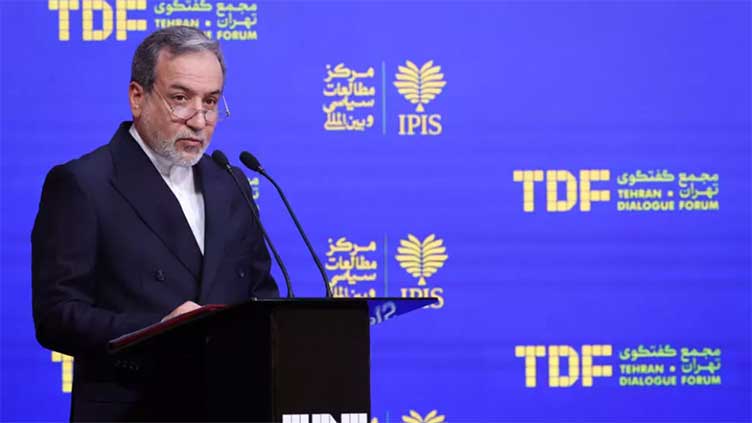Iran says to keep enriching uranium, even with a deal

World
Tehran says its nuclear ambitions are for civilian purposes only, and entirely peaceful
TEHRAN (AFP) – Iran's Foreign Minister Abbas Araghchi said on Sunday his country would keep enriching uranium "with or without a deal" with world powers, despite ongoing negotiations over its nuclear programme.
"If the US is interested in ensuring that Iran will not have nuclear weapons, a deal is within reach, and we are ready for a serious conversation to achieve a solution that will forever ensure that outcome," Araghchi posted on X.
"Enrichment in Iran, however, will continue with or without a deal," he said.
Iran currently enriches uranium to 60 percent, far above the 3.67-percent limit set in the 2015 deal but below the 90 percent needed for a nuclear warhead.
Tehran says its nuclear ambitions are for civilian purposes only, and entirely peaceful.
It also insists its right to continue enriching uranium for peaceful purposes is "non-negotiable", but says it would be open to temporary restrictions on how much uranium it enriches and to what level.
On Wednesday, Iranian atomic energy agency chief Mohammad Eslami reiterated that Tehran "does not seek nuclear militarisation", and said enrichment was under the supervision of the UN nuclear watchdog.
"The dismantling of enrichment is not accepted by Iran," Eslami said.
Araghchi also said Sunday the country was ready to rebuild trust with European powers considering whether to reimpose UN sanctions on the Islamic republic under a 2015 nuclear deal.
"Iran is ready, should it observe genuine will and an independent approach from the European parties, to begin a new chapter in its relations with Europe," he told a diplomatic forum in Tehran.
"If Europe possesses the necessary will to rectify this path, Iran sees no obstacle to rebuilding mutual trust and expanding relations."
On Friday, senior Iranian diplomats met counterparts from Britain, France and Germany for talks on the status of US-Iran nuclear negotiations.
'Snapback' mechanism
Tehran has held four rounds of nuclear talks with Washington, the highest-level contact between the two foes since the United States abandoned the 2015 nuclear accord.
US President Donald Trump effectively torpedoed the deal in 2018 during his first term, by unilaterally pulling out and reimposing sanctions on Iran's oil exports and banking sector.
A year later, Iran began rolling back its commitments to the agreement, which had offered sanctions relief in return for UN-monitored restrictions on its nuclear activities.
The three European powers – party to the 2015 accord – are weighing whether to trigger the "snapback" mechanism, which would reinstate UN sanctions in response to Iranian non-compliance. That option expires in October.
Araghchi earlier this month warned of "irreversible" consequences if Britain, France and Germany moved to reimpose sanctions.
He had previously proposed visiting London, Paris and Berlin for discussions on the nuclear issue as well as other areas "of mutual interest and concern".
In his speech on Sunday, he urged the Europeans to focus more on shared interests rather than differences.
He said the Europeans should have a greater role in the US-Iran nuclear talks.
"We want Europe to play its role, even if it has minimised its own role," the IRNA news agency quoted Araghchi as saying.
The Oman-mediated nuclear talks aim to conclude a new deal that would prevent Iran from acquiring nuclear weapons – an ambition Tehran has consistently denied – in exchange for lifting the sanctions.
On the sidelines of the forum Araghchi met his Omani counterpart Badr Albusaidi and Qatari Prime Minister Sheikh Mohammed bin Abdulrahman bin Jassim Al-Thani.
An Omani foreign ministry statement said Albusaidi and Araghchi discussed ways of reaching "the desired agreement between the United States and Iran".
US 'red line'
Reuters adds: Any deal between the United States and Iran must include an agreement not to enrich uranium, US special envoy Steve Witkoff said on Sunday, a comment that drew criticism from Tehran.
While Witkoff was reiterating President Donald Trump's position about uranium enrichment, Iran's response was evidence that the two sides have a long way to go to reach any agreement over Iran's nuclear programme.
"We have one very, very clear red line, and that is enrichment. We cannot allow even 1% of an enrichment capability," Witkoff said during an interview aired on ABC's "This Week" programme.
Everything begins, from the Trump administration's standpoint, "with a deal that does not include enrichment. We cannot have that. Because enrichment enables weaponization. And we will not allow a bomb to get here," Witkoff said.
Witkoff said he is optimistic about negotiations and thinks the parties will hold talks again in Europe this week.
"We hope that it will lead to some real positivity," Witkoff said.
Araqchi said the date and location of the next round of talks will be announced soon.
Trump said on Thursday that the United States was getting very close to securing a nuclear deal with Iran, but on Friday said Iran needs to move quickly. Trump told reporters on Friday aboard Air Force One after departing the United Arab Emirates: "They have a proposal. More importantly, they know they have to move quickly or something bad - something bad's going to happen," according to an audio recording of the remarks.
Araqchi said on social media that Tehran had not received a US proposal.


